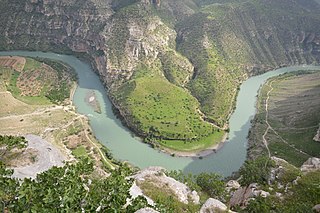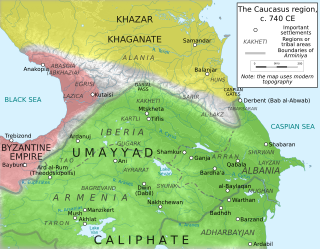
The Encyclopaedia of Islam (EI) is a reference work that focuses on the academic study of Islam. It is published by Brill and provides information on various aspects of Islam and the Islamic world. It is considered to be the standard reference work in the field of Islamic studies. The first edition was published in 1913–1938, the second in 1954–2005, and the third was begun in 2007.

Siirt Province, is a province of Turkey, located in the southeast. The province borders Bitlis to the north, Batman to the west, Mardin to the southwest, Şırnak to the south, and Van to the east. Its area is 5,717 km2, and its population is 331,311 (2022). Its capital is Siirt. It encompasses 12 municipalities, 280 villages and 214 hamlets.
Abu'l-Aysh ibn al-Qasim Jannun was the twelfth Idrisid ruler and sultan of Morocco. He took over after Al Qasim Gannum in 948 until his death in 954.
Al-Hasan ibn al-Qasim Jannun was the thirteenth and the last Idrisid ruler and sultan of Morocco. He took over after Abu l-Aish Ahmad in 954 until his capture by the Umayyads in 974. He was then exiled to Córdoba, Spain where he died in 985.
The Encyclopaedia of the Qurʾān is an encyclopedia dedicated to Quranic Studies edited by Islamic scholar Jane Dammen McAuliffe, and published by Brill Publishers.

Chehriq is a citadel located in north-western Iran in West Azarbaijan Province, Salmas County, near the Turkish border.

Enderûn was the term used in the Ottoman Empire to designate the "Interior Service" of the imperial court, concerned with the private service of the Ottoman sultans, as opposed to the state-administrative "Exterior Service" (Birûn). Its name derives from the location of the sultan's apartments in the inner courts of the Topkapi Palace; its head was the Kapi Agha.
Abu 'Abd Allah Jamal al-Din Muḥammad ibn Abd Allāh ibn Malik al-Ta'i al-Jayyani was an Arab grammarian born in Jaén. After leaving al-Andalus for the Near East, and taught Arabic language and literature in Aleppo and Hamāt, before eventually settled in Damascus, where he began the most productive period of his life. He was a senior master at the Adiliyya Madrasa. His reputation in Arabic literature was cemented by his al-Khulāsa al-alfiyya, a versification of Arabic grammar, for which at least 43 commentaries have been written.
Abu Imran Musa ibn Isa ibn Abi 'l-Hajjal-Fasi was a Moroccan Maliki faqīh born at Fez to a Berber or Arab family whose nisba is impossible to reconstruct.

The Encyclopaedia Islamica is an encyclopedia on Islamic and Iranian studies published by Brill, comprising a projected 16-volume translation of selected articles from the new Persian Dā'erat-ol-Ma'āref-e Bozorg-e Eslāmi, supplemented by additional articles written in English by scholars affiliated with the Institute of Ismaili Studies.
Baba is an honorific term, of Persian origin, used in several West Asian and South Asian cultures.

The Patriarchal Province of Seleucia-Ctesiphon was an ecclesiastical province of the Church of the East, with see in Seleucia-Ctesiphon. It was attested between the fifth and thirteenth centuries. As its name entails, it was the province of the patriarch of the Church of the East. The province consisted of a number of dioceses in the region of Beth Aramaye, between Basra and Kirkuk, which were placed under the patriarch's direct supervision at the synod of Yahballaha I in 420.

Arabs first established themselves in the Caucasus in the eighth century, during the Arab conquest of Persia. The process of shrinking of the Abbasid Caliphate in the tenth century was followed by the establishment of several Arab-ruled principalities in the region, chiefly the principality of Shirvan ruled by the Mazyadid dynasty. As the rulers of Shirvan spread their control over much of the Southeast Caucasus and at the same time found themselves more and more isolated from the Arab world, they were undergoing gradual Persianisation. Arab personal names of the Shirvanshahs gave way to Persian ones, members of the ruling dynasty were claiming Ancient Persian descent and Persian gradually became the language of the court and the urban population, while the rural population continued to speak the indigenous languages of Caucasian Albania. However by the seventeenth century a local Turkic idiom became the language of everyday life, as well as the language of interethnic communication.
The Shafi'i school, or Madhhab al-Shāfiʿī, is one of the four major traditional schools of religious law (madhhab) in the Sunnī branch of Islam. It was founded by Muslim theologian Muḥammad ibn Idrīs al-Shāfiʿī, "the father of Muslim jurisprudence", in the early 9th century.

The Marashiyan or Marashis were an Iranian Sayyid Twelver Shiʿite dynasty of Mazandarani origin, ruling in Mazandaran from 1359 to 1596. The dynasty was founded by Mir-i Buzurg, a Sayyid native to Dabudasht. Their capitals were Amol, Sari, and Vatashan.
S̲h̲āhbandar, was an official of the ports in Safavid Persia and one also known on other shores of the Indian Ocean. The Shahbandar was in charge of the traders and the collection of taxes.
Tafsir Safi is an exegesis of the Qur'an written by 17th century Shia scholar Mohsen Fayz Kashani. This commentary on the Qur'an mostly cites from the Twelve Imams and may be classified as a work on hadith. It belongs to an era when most tafsirs relied "heavily on polemical hadith tradition buttressed by the accumulated wealth of hagiography and the euphoria of power after a long history of frustration" imposed on the Shias.
K̲h̲ayālī Mehmed Bey, nicknamed Bekār Memi, was an Ottoman poet born in Yenice-i Vardar. He was a bitter enemy of poet Yahya Bey.
Mirza Habibollah Shirazi, known as Qaani was one of the most famous poets of the Qajar era. He was born in 1808 in Shiraz, where he attended elementary school. At an early age, Qaani went to Mashhad for further study. He wrote a poem to praise Fath Ali Shah Qajar during the former's visit to Tehran, and called him "Mojtahed of the Poets".








